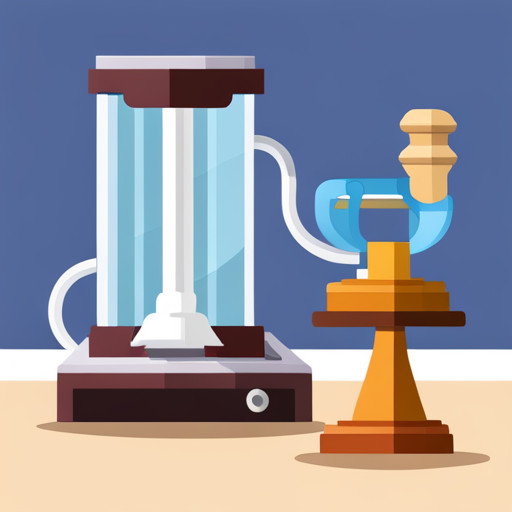Philips CPAP
Navigating the turbulent seas of sleep apnea, Continuous Positive Airway Pressure (CPAP) machines, particularly those from industry leader Philips, have served as a beacon of relief. However, recent upheavals—involving a significant recall due to potential health risks—have cast shadows of doubt. This article aims to illuminate the nuances of the Philips CPAP recall, offering insights into foam degradation issues, PE-PUR testing results, and the anticipated long-term health implications.

Key Takeaways
- Philips CPAP machines have been recalled by the FDA due to potential health risks associated with the use of a new silicone foam.
- Philips knew about foam degradation in their CPAP machines since 2015 but did not inform the public.
- In June 2022, Philips released testing results showing emissions of toxic chemicals below established limits and no anticipated long-term health consequences.
- The FDA is still awaiting approval for ozone gas sanitizing devices mentioned by Philips for cleaning CPAP machines.
Understanding the Purpose of Philips CPAP Machines
Although primarily recognized for their function in treating sleep apnea, Philips CPAP machines also serve to improve overall sleep quality and reduce snoring, thereby playing a crucial role in enhancing the user's health and wellbeing. These machines pressurize room air and deliver it through a tube to a mask worn on the face, keeping the airways open and improving breathing. The benefits of using Philips CPAP machines extend to better sleep quality and minimized snoring. However, it's important to consider alternatives to Philips CPAP for sleep apnea treatment, particularly in light of recent device recalls. Alternatives may include positional therapy, oral appliances, or lifestyle changes, which should be discussed thoroughly with a healthcare provider.
How Philips CPAP Machines Work
The Philips CPAP machine, a critical tool for managing sleep apnea, works by pressurizing room air and delivering it through a mask, and this simple yet effective mechanism can greatly improve sleep quality. The technology behind Philips CPAP machines involves a motor that creates a high-pressure flow of air, controlled to the user's needs, to ensure the airway remains open during sleep. This prevents the interruptions in breathing that are characteristic of sleep apnea. The benefits of using Philips CPAP machines include improved sleep, reduced daytime fatigue, and lower blood pressure. Regular use of these machines can also help prevent serious health complications linked with untreated sleep apnea, including heart disease, stroke, and diabetes.
The Importance of Philips CPAP in Sleep Apnea Treatment
Utilizing the Philips CPAP machine, a concrete solution for sleep apnea, can lead to substantial improvements in sleep quality and overall health, and it is often the first line of treatment recommended by medical professionals. The impact of long-term CPAP use on overall health is significant, with patients reporting improved energy levels, better mood, and a decrease in daytime sleepiness. The continuous pressure keeps the airway open, reducing apnea episodes and associated health risks such as heart disease and stroke. Compared to other sleep apnea therapies, CPAP treatment is cost-effective, offering a lasting solution with consistent use. In conclusion, Philips CPAP machines play a pivotal role in sleep apnea treatment, offering a cost-effective and health-promoting solution.
Unique Features of Philips CPAP Machines and Masks
Philips CPAP machines' innovative features, coupled with their uniquely designed masks, offer users a comfortable and effective sleep apnea treatment solution. Understanding the benefits of using Philips CPAP machines enables users to appreciate the precision with which these machines operate. An integral part is the DreamWear masks, designed with an open-face construction and a flexible over-the-head frame for maximum comfort. Comparing Philips CPAP machines to other brands reveals advanced features such as automatic pressure adjustments, noise reduction, and smart connectivity for tracking sleep patterns. Moreover, Philips CPAP machines stand out for their durability and user-friendly interface, offering users a reliable and efficient solution for sleep apnea treatment. These distinctive features underscore Philips' commitment to enhancing users' quality of life.
The Role of Air Pressure in Philips CPAP Machines
In Philips CPAP machines, air pressure's crucial role is to maintain open airways during sleep, and this pressure is carefully calibrated to meet individual patient needs. The impact of air pressure on sleep apnea treatment is significant, as it ensures a steady flow of oxygen, preventing the intermittent cessation of breathing characteristic of sleep apnea. This constant, measured air pressure inhibits the collapse of the airways, thus eliminating the periods of apnea. Moreover, the effectiveness of air pressure in reducing snoring is well-documented. By keeping the airways open and unobstructed, these machines mitigate the vibrations of respiratory structures, which cause the harsh sound of snoring. This dual function of air pressure not only improves sleep quality but also reduces associated health hazards.
Improving Sleep Quality With Philips CPAP
Achieving a good night's sleep can be a challenging feat for those suffering from sleep apnea, but the use of Philips CPAP machines has been proven to significantly enhance sleep quality and overall health. The benefits of using Philips CPAP machines extend beyond improved sleep; they also include decreased daytime fatigue, lower blood pressure, and reduced risk of heart disease. These machines work by providing a steady stream of air to keep the airways open, facilitating easier breathing throughout the night. As effective as Philips CPAP machines are, it's important to note that alternatives exist. These may include lifestyle modifications, oral appliances, and surgical procedures, which can also contribute to improved sleep quality and overall health. It's crucial to explore all options with a healthcare provider to find the best solution for individual needs.
Adjusting to Life With a Philips CPAP Machine
Transitioning to daily use of a Philips CPAP machine may present initial challenges, but with patience and consistent use, most individuals find their sleep quality significantly improved. The adjusting difficulties often revolve around the discomfort of wearing the mask and the noise of the machine. However, patient experiences indicate that these issues diminish over time. Some users report feeling claustrophobic initially, but using relaxation techniques and gradually increasing usage time can help. The noise of the machine, while bothersome at first, often becomes a reassuring background sound signifying a better night's sleep. It is crucial to communicate with your healthcare provider about any issues or discomfort, as they can provide guidance and adjustments to ease the transition.
The Necessity of Consistent Use of Philips CPAP Machines
For optimal effectiveness of Philips CPAP machines, consistent use is imperative, and it contributes significantly to improved sleep quality and overall health. Understanding patient compliance is essential to ensure regular usage, which directly influences the long-term effects of CPAP treatment. While initial discomfort may deter some users, persistence typically leads to acclimatization and enhanced sleep quality. Regular use of CPAP devices has been linked with decreased daytime fatigue, improved cognitive function, and lower blood pressure. It is crucial, therefore, to emphasize the importance of consistency in using Philips CPAP machines to patients. Committed adherence to the CPAP treatment regimen can provide significant health benefits, underscoring the necessity of consistent use for optimal patient outcomes.
Common Side Effects Associated With Philips CPAP Machines
While Philips CPAP machines significantly improve the quality of sleep and overall health of patients with sleep apnea, they can also cause a variety of common side effects which must be effectively managed and mitigated. Despite the Philips CPAP machine effectiveness, users may experience discomfort such as dry mouth, nasal congestion, or initial difficulty in sleeping. More serious side effects, although rare, may include headaches and upper respiratory infections. If symptoms persist, patients are advised to consult their healthcare provider for potential alternatives to Philips CPAP treatment. Alternatives could include lifestyle changes, oral appliances, or surgical procedures. Although these side effects can be bothersome, it's important to remember that untreated sleep apnea poses much greater health risks.
Rare But Serious Side Effects of Philips CPAP Machines
Despite their overall effectiveness, Philips CPAP machines can occasionally lead to serious health complications, including a rare but grave risk of adverse events and patient deaths. This has raised philips cpap machine safety concerns among both medical professionals and patients. The potential health risks of Philips CPAP machines are not to be taken lightly. In some instances, these machines have been linked to respiratory problems, heart conditions, and other serious health issues. It's crucial to understand that while these severe complications are infrequent, they can be life-threatening when they do occur. Consequently, it's essential for users and healthcare providers to closely monitor any changes in health status while using Philips CPAP machines and report any unusual symptoms immediately.
The Controversy Surrounding the Philips CPAP Recall
Amid mounting concerns and growing public scrutiny, the controversy surrounding the Philips CPAP recall has triggered significant debate, and it stems largely from the company's alleged delay in addressing potential health risks associated with their machines. The Philips CPAP recall impact is far-reaching, affecting numerous patients worldwide who rely on these devices for sleep apnea management. Medical professionals and users alike are questioning the company's transparency and communication regarding the potential hazards. Legal actions against Philips CPAP are being pursued by patients who allege they experienced adverse health effects due to the recalled machines. This controversy underscores the need for greater oversight in the medical device industry, reinforcing the importance of patient safety and timely, transparent communication from manufacturers.
Unraveling the Philips CPAP Foam Degradation Issue
Surprisingly, the issue of foam degradation in Philips CPAP machines, which has raised serious health concerns among users, has been a known problem since 2015, yet it was not publicly addressed until the recent recall. This delay has magnified Philips CPAP foam safety concerns, as the degraded foam particles and gases can lead to respiratory issues, headaches, and even carcinogenic exposure. The impact of Philips CPAP recall on patients has been substantial, with users grappling with potential health risks and the challenge of finding alternative sleep apnea treatment methods. The recall has disrupted the lives of numerous patients, inciting fear and uncertainty. It underscores the critical need for comprehensive quality control and timely, transparent communication in the medical device industry.
Results From Philips CPAP PE-PUR Testing
The publication of Philips's CPAP PE-PUR testing results has brought a new dimension to the ongoing discussion surrounding their recalled sleep apnea devices. These results shed light on the impact of the Philips CPAP recall on sleep apnea patients, who were in a state of unease due to potential health risks. Despite Philips's report showing emissions of toxic chemicals below established limits, the recall has undoubtedly created a sense of insecurity. Furthermore, the legal implications of the Philips CPAP recall continue to unravel. The fact that Philips knew about foam degradation as early as 2015 without informing the public has raised severe ethical concerns, casting a shadow over the company's credibility and sparking a wave of lawsuits.
The Role of Ozone Gas in Philips CPAP Cleaning
Undeniably, the role of ozone gas in the cleaning process of Philips CPAP machines is a critical aspect to consider in the broader conversation surrounding these devices. The use of ozone gas for sanitizing purposes has raised ozone gas safety concerns, as the gas can potentially degrade the machines' components and impair their functionality. Exposure to high levels of ozone can also pose health risks to the users. Considering these factors, alternative cleaning methods are advised. Cleaning the CPAP machine manually using mild detergent and warm water is one such method. Some manufacturers also offer specially designed wipes and sprays for this purpose. In summary, while ozone gas can effectively sanitize CPAP machines, its use necessitates caution due to potential safety concerns.
Awaiting FDA Approval for Philips CPAP Cleaning Devices
In light of the recent concerns with the Philips CPAP machines, the company has proposed the use of ozone gas sanitizing devices for cleaning, but FDA approval for these devices is still pending. This has prompted users to seek alternatives to Philips CPAP cleaning devices, such as UV cleaners and heated humidifiers. However, it's important to consider potential health risks of using non FDA approved CPAP cleaning devices. Incorrect cleaning can lead to bacterial growth, which can cause infections. Moreover, non-approved sanitizers may emit harmful ozone levels that exacerbate respiratory problems. Therefore, users should carefully evaluate these alternatives, prioritize FDA-approved methods, and consult healthcare professionals to ensure the safety and effectiveness of their CPAP machine cleaning regimen.
Frequently Asked Questions
What Other Brands of CPAP Machines Are Available in the Market as an Alternative to Philips CPAP?
Several brands offer alternative solutions to Philips for treating sleep apnea with CPAP machines. These include ResMed, Fisher & Paykel, and DeVilbiss, each providing unique features and designs. Maintenance of these CPAP machines is crucial for effective sleep apnea therapy. Regular cleaning, filter replacement, and professional checks are part of comprehensive CPAP machine maintenance. These brands, along with proper care, can provide reliable sleep apnea solutions for patients.
How Does the Cost of Philips CPAP Machines Compare to Other Brands?
When evaluating the cost of CPAP machines, it's crucial to consider both the initial purchase price and ongoing costs such as maintenance and accessories. While the upfront cost of Philips CPAP machines is comparable to other brands, the expense of Philips CPAP maintenance and accessories can add up over time. It's recommended to compare these costs across brands to ensure you're making a cost-effective decision for your long-term sleep apnea treatment.
What Is the Process for Getting a Philips CPAP Machine? Do You Need a Prescription?
Acquiring a Continuous Positive Airway Pressure (CPAP) machine typically requires a prescription from a healthcare provider, following a diagnosis of sleep apnea. The process involves sleep studies, consultations, and potentially, CPAP Machine Maintenance and Sleep Apnea Education. Once prescribed, the machine settings are adjusted to an individual's needs. It's crucial to understand the maintenance of the machine for its effective functioning and longevity, as well as continual education on managing sleep apnea.
Does Insurance Typically Cover the Cost of Philips CPAP Machines?
In the vast landscape of healthcare, insurance eligibility and coverage requirements can greatly vary. Typically, most insurance providers do cover the cost of CPAP machines as they are recognized as a necessary treatment for sleep apnea. However, the amount of coverage depends on individual insurance plans and their specific policies. Some may require a diagnosis of sleep apnea through a sleep study, as well as a doctor's prescription for the device. Always verify with your insurance provider.
What Customer Support or Warranties Does Philips Offer for Their CPAP Machines?
Regarding customer support and warranties for CPAP machines, manufacturers typically provide a range of services. This can include comprehensive warranties, dedicated customer service teams, and detailed guidance on machine maintenance and product features. Assistance may also encompass troubleshooting, repair services, and sometimes, replacement policies. These support services are designed to ensure the optimal performance of the machines and help users navigate any technical issues they might encounter during usage.
Conclusion
The Philips CPAP recall unraveled significant concerns in sleep apnea treatment devices. The PE-PUR testing results, while indicating emission of toxic chemicals below established limits, have undoubtedly caused anxiety among users. While Philips seeks FDA approval for their cleaning devices, the future of their CPAP machines hangs in the balance. It remains to be seen how this recall will impact Philips and the broader CPAP industry, highlighting the importance of stringent safety measures in medical devices.

This post has been generated by AI and was not reviewed by editors. This is Not legal advice. Please consult with an attorney.




